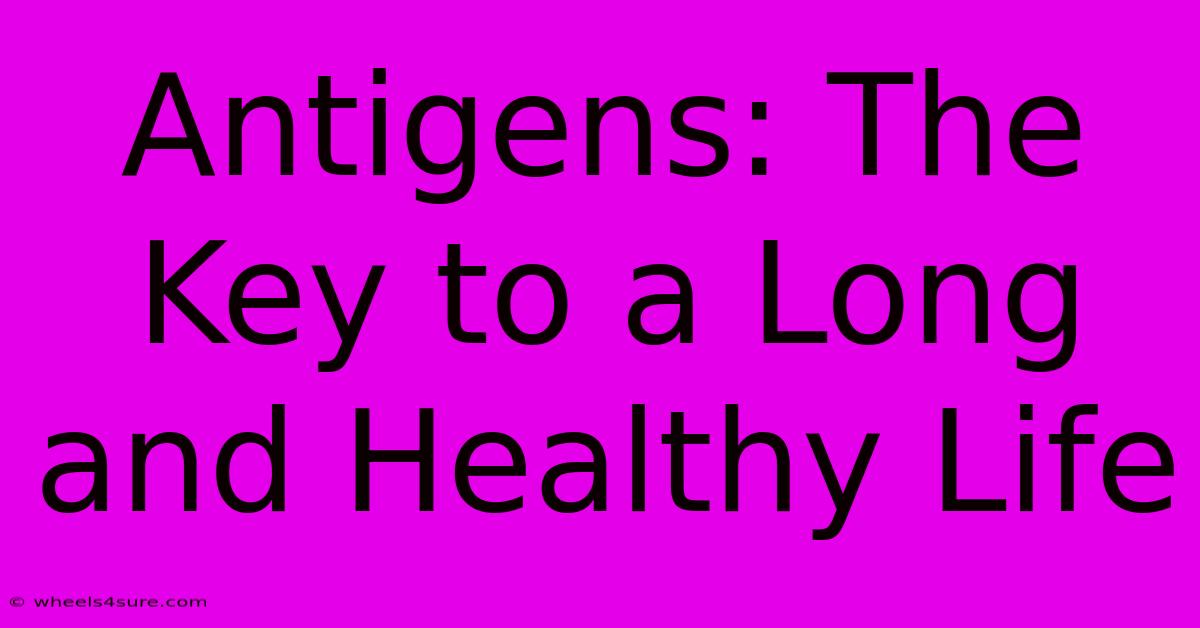Antigens: The Key To A Long And Healthy Life

Table of Contents
Antigens: The Key to a Long and Healthy Life
Our immune system is a complex and fascinating network, constantly working to protect us from harmful invaders. At the heart of this defense mechanism lies the antigen – a substance that triggers an immune response. Understanding antigens is key to understanding how our bodies fight disease and maintain a long and healthy life. This article will delve into the world of antigens, exploring their role in immunity, their connection to various diseases, and how we can support a robust immune response.
What are Antigens?
Simply put, antigens are molecules that are recognized as "foreign" by the immune system. These molecules can be part of viruses, bacteria, fungi, parasites, or even substances like pollen or certain foods. The immune system identifies antigens through specialized cells, and this recognition triggers a cascade of events designed to neutralize or eliminate the threat. Antigens are typically proteins or polysaccharides, but they can also be lipids or nucleic acids.
Types of Antigens:
Antigens can be broadly categorized into several types:
- Exogenous antigens: These originate from outside the body, such as those found on the surface of bacteria or viruses. They are taken up by antigen-presenting cells (APCs) and presented to T cells to initiate an immune response.
- Endogenous antigens: These are produced within the body's cells, often as a result of viral infection or cancerous transformation. They are processed and presented by MHC class I molecules on the cell surface, triggering a cytotoxic T cell response.
- Autoantigens: These are self-antigens – molecules normally found within the body – that are mistakenly recognized as foreign by the immune system. This misidentification is the basis of autoimmune diseases.
- Tumor antigens: These are antigens expressed by cancerous cells, distinguishing them from normal cells. The immune system can recognize and attack these tumor antigens, leading to tumor rejection.
The Immune Response to Antigens:
When an antigen is detected, the immune system launches a targeted response. This involves a complex interplay of various cells, including:
- Antigen-presenting cells (APCs): These cells, such as macrophages and dendritic cells, engulf antigens and present fragments of them to T cells.
- T cells: These cells are crucial for coordinating the immune response. Helper T cells release cytokines that activate other immune cells, while cytotoxic T cells directly kill infected or cancerous cells.
- B cells: These cells produce antibodies, specialized proteins that bind to antigens and neutralize them.
Antigens and Disease:
Antigens play a central role in various diseases. Understanding the specific antigens involved can lead to the development of targeted therapies.
Infections:
Viral and bacterial infections are characterized by the presence of specific antigens on the surface of the pathogens. The immune system recognizes these antigens and mounts an attack to clear the infection. Vaccines work by introducing weakened or inactivated antigens to stimulate an immune response without causing illness, thereby providing protection against future infection.
Autoimmune Diseases:
In autoimmune diseases, the immune system mistakenly attacks the body's own tissues and organs. This occurs because the immune system recognizes self-antigens as foreign. Examples include rheumatoid arthritis, lupus, and type 1 diabetes.
Cancer:
Cancer cells often express unique antigens that distinguish them from normal cells. The immune system can recognize and attack these tumor antigens, leading to tumor rejection. Immunotherapy harnesses this natural ability to fight cancer.
Supporting a Strong Immune Response:
Maintaining a strong and healthy immune system is crucial for combating diseases. Several factors contribute to a robust immune response:
- Healthy Diet: A balanced diet rich in fruits, vegetables, and whole grains provides essential nutrients that support immune function.
- Regular Exercise: Physical activity boosts the immune system and helps reduce inflammation.
- Adequate Sleep: Sufficient sleep is essential for immune cell regeneration and function.
- Stress Management: Chronic stress can weaken the immune system. Practicing stress-reduction techniques, such as meditation or yoga, is beneficial.
Conclusion:
Antigens are fundamental to our understanding of immunity and disease. By learning more about how our immune system interacts with antigens, we can develop better strategies for preventing and treating illnesses and promoting a long and healthy life. Further research into the complex world of antigens promises to yield even greater insights into disease mechanisms and potential therapeutic interventions.

Thank you for visiting our website wich cover about Antigens: The Key To A Long And Healthy Life. We hope the information provided has been useful to you. Feel free to contact us if you have any questions or need further assistance. See you next time and dont miss to bookmark.
Featured Posts
-
Rohit Sharma Net Worth And Philanthropic Efforts
Mar 31, 2025
-
Ice Age Characters Their Hidden Strengths
Mar 31, 2025
-
Steve Wozniaks Net Worth Investing In The Future
Mar 31, 2025
-
Faysal Qureshi S Son A Story Of Resilience
Mar 31, 2025
-
Son Suk Kus Best Kissing Scenes
Mar 31, 2025
